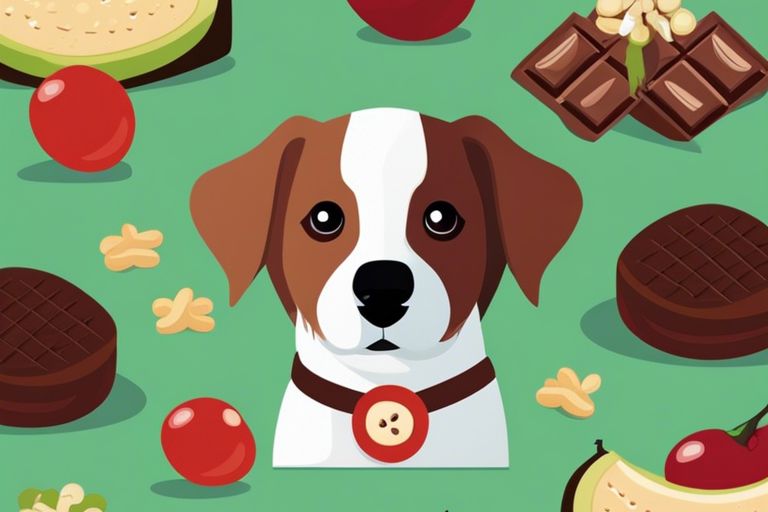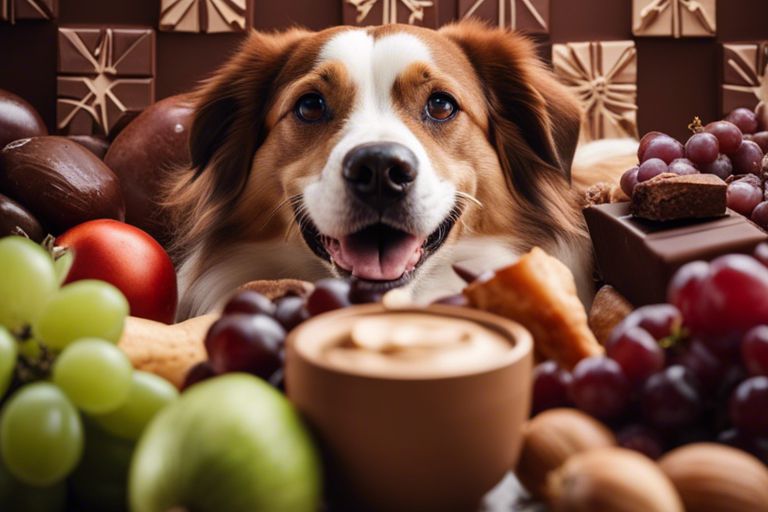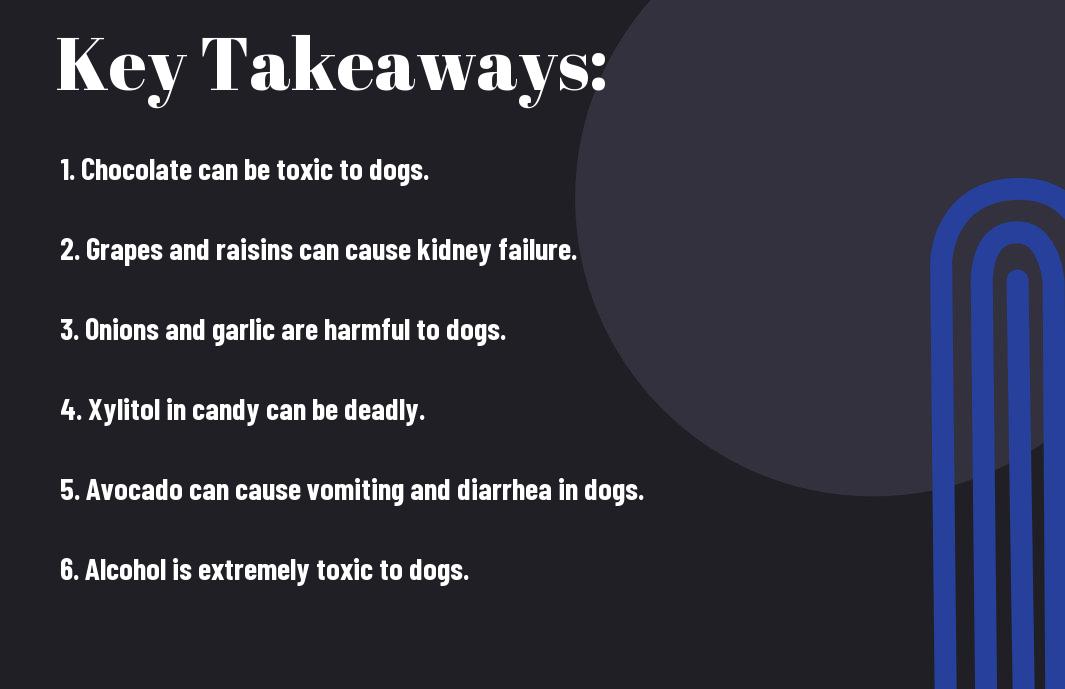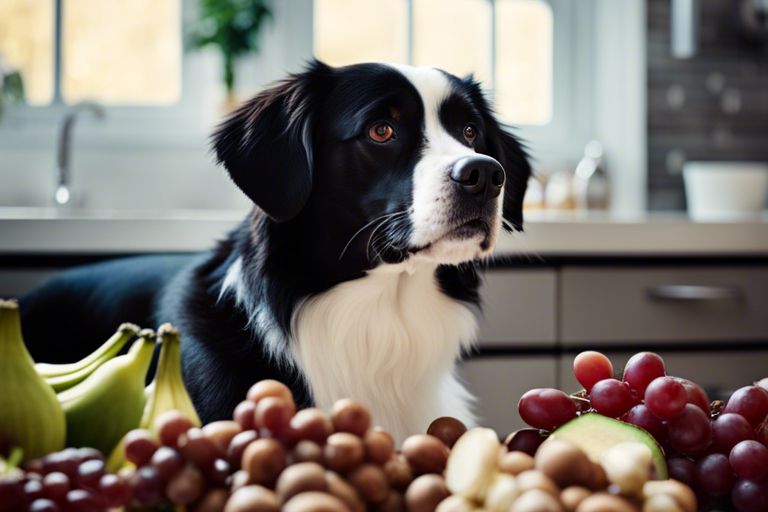Foods that may seem tasty to you, might not be so good for your pup too! In this whimsical journey, we will explore 5 foods that can bring harm, causing alarm. Be mindful of, what’s yummy for you, may not be for your doggie too!
Key Takeaways:
- Chocolate: Keep it out of reach, oh do not feed! It’s toxic to dogs and can make them quite ill indeed.
- Grapes and Raisins: These can cause kidney failure, oh what a fright! So keep these foods far out of sight.
- Garlic and Onions: They may add flavor to your dish, but for dogs, they’re not a tasty wish. These can lead to anemia, oh what a shame! So please, do not feed them to your furry friend game.
The Forbidden Five
While dogs may beg and give you those puppy eyes when you’re enjoying a meal, it’s important to know that not all human foods are safe for your furry friend. Here are the Forbidden Five that you should never feed to your dog.
Chocolate: A Sweet Treat for Humans Only
Any amount of chocolate is off-limits for your canine companion. Chocolate contains theobromine and caffeine, which are toxic to dogs. Even a small amount can cause vomiting, diarrhea, rapid breathing, increased heart rate, and even seizures in dogs.
Grapes and Raisins: Tiny but Toxic
Tiny as they may be, grapes and raisins can cause big problems for your dog. These fruits can lead to kidney failure in dogs, with symptoms including vomiting, lethargy, and a lack of appetite. It’s best to keep these snacks far away from your furry friend’s reach.
Treat your dog to delicious and safe treats specifically made for them, and avoid feeding them any grapes or raisins.
Onions and Garlic: Flavorful but Fatal
Flavorful additions to our meals, onions and garlic contain compounds that can damage a dog’s red blood cells, leading to anemia. Symptoms of onion and garlic toxicity in dogs include weakness, vomiting, and breathing difficulties. Keep these ingredients out of your dog’s dishes and securely stored away.
Onions and garlic might make your meals tasty, but they spell trouble for your dog’s health. Stick to dog-friendly ingredients to keep them wagging their tails happily.
Macadamia Nuts: A Crunchy Conundrum
Treat your dog to safe and crunchy snacks, but keep macadamia nuts out of their reach. These nuts can cause weakness, tremors, and hyperthermia in dogs. If your dog accidentally consumes macadamia nuts, contact your veterinarian immediately for guidance.
With their delicious crunch, macadamia nuts might tempt your pup, but it’s crucial to prevent them from snacking on these harmful nuts.
Avocado: A Fruit That’s Off-Limits
Avocado might be a tasty and creamy treat for you, but it’s a big no-no for your dog. The fruit, leaves, and seed of avocados contain persin, which can cause vomiting and diarrhea in dogs. Additionally, the large seed poses a choking hazard.
Crunchy and creamy, avocados are delicious for you, but for your pup, it’s best to steer clear of this fruit to keep them healthy and happy.
Why These Foods Are Harmful
Theobromine and Caffeine: Chocolate’s Deadly Duo
An unexpected treat, a moment you savor, but for your furry friend, it could mean real danger. An innocent-looking chocolate piece, a snack you adore, a tiny bite for your dog could lead to much more. The theobromine and caffeine within that sweet delight can cause tremors and seizures, a pet owner’s fright.
Unknown Toxins: The Mystery of Grapes and Raisins
Grapes on a vine, raisins in a bun, delightful for you, but for your dog, no fun. Unknown toxins they harbor, a threat in disguise, even a small amount could lead to demise. Mysterious yet deadly, their effects not clear, best to keep them away, a warning you should adhere.
Unknown toxins in grapes and raisins can cause kidney failure in dogs, leading to serious health complications.
Hemolytic Anemia: Onions and Garlic’s Devastating Effect
For a flavorful twist, in your cooking you’ll find, onions and garlic, staples that bind. But for your loyal pup, a dangerous brew, hemolytic anemia, a risk all too true. Destroying red blood cells, causing weakness and pain, these aromatic seasonings could bring about strain.
A small amount of onions or garlic can lead to hemolytic anemia in dogs, a condition where the red blood cells are destroyed, affecting the oxygen-carrying capacity of the blood.
Macadamia Nut Toxicity: A Gastrointestinal Nightmare
Gastrointestinal distress, a nutty nightmare tale, macadamia nuts causing dogs to wail. Vomiting and weakness, a troubling sign, these nuts are toxic, a warning you must align. Keep them out of reach, in a high, safe abode, protect your furry friend from this harmful explode.
Macadamia nut toxicity can result in symptoms like vomiting, weakness, and discomfort in dogs, leading to a distressing experience for your pet.
Persin and Fatty Acids: Avocado’s Toxic Combo
Fatty acids and persin, a lethal mix you should know, in avocados they lurk, a toxin’s bold show. Keep guacamole away, the fruit and its parts, for your dog’s well-being, protect their hearts. These substances can bring tummy troubles and more, best to avoid them, to keep your furry friend’s health in store.
These compounds in avocados can lead to gastrointestinal issues and potential heart problems in dogs, making it important to steer clear of this fruit to safeguard your pet’s health.
Symptoms to Watch Out For
Diarrhea: Vomiting and Diarrhea: The First Signs of Trouble
Keep an eye out for vomiting and diarrhea, as these are usually the first signs that your dog has consumed something they shouldn’t have. If you notice these symptoms after your dog has ingested a harmful food, it’s crucial to contact your veterinarian immediately.
Increased Heart Rate and Restlessness: Chocolate’s Calling Card
Increased heart rate and restlessness are common symptoms of chocolate poisoning in dogs. If you suspect that your furry friend has eaten chocolate, watch out for these signs and seek veterinary care promptly.
Chocolate contains theobromine, a stimulant that can cause these symptoms as well as more severe issues like seizures and even death in dogs. It’s crucial to keep chocolate out of your dog’s reach to prevent accidental ingestion.
Watch Out: Kidney Failure: The Silent Killer
Watch out for signs of kidney failure such as decreased urination, loss of appetite, and lethargy if your dog has consumed foods like grapes or raisins. Kidney failure can be life-threatening if not addressed promptly, so seek veterinary attention if you notice any of these symptoms in your furry companion.
It’s crucial to keep potentially harmful foods out of your dog’s reach and be vigilant about monitoring their behavior for any unusual signs.
Rate Signs: Weakness and Depression: The Macadamia Nut Blues
Watch out for signs of weakness and depression if your dog has ingested macadamia nuts. These nuts contain toxins that can lead to muscle weakness, tremors, and lethargy in dogs. Contact your veterinarian right away if you notice any of these symptoms in your furry friend.
Rate of recovery can vary depending on the amount of nuts ingested and the size of your dog, so it’s crucial to seek medical attention for proper treatment.
Restlessness For instance: Respiratory Distress: Avocado’s Hidden Danger
Restlessness and difficulty breathing can indicate respiratory distress in dogs who have eaten avocado. Avocado contains a substance called persin, which can be toxic to dogs and cause symptoms like difficulty breathing and fluid accumulation in the chest.
For instance, if you suspect that your dog has ingested avocado and is experiencing respiratory distress, seek immediate veterinary care to prevent any further complications.
What to Do If Your Dog Ingests These Foods
To address the ingestion of harmful foods by your furry friend, there are several steps you can take to ensure their safety and well-being. Do not forget, always consult your veterinarian before taking any action.
Induce Vomiting (But Only If Advised)
What to do first if your dog consumes toxic foods is induce vomiting, but only under the advice of a professional. This can help expel the harmful substances from your dog’s system. However, not all toxic foods require vomiting, so it’s crucial to seek guidance from your veterinarian.
Activated Charcoal: A Possible Antidote
Any ingestion of toxic foods can be challenging, but activated charcoal can sometimes be used as an antidote. It works by binding to the toxins in your dog’s stomach, preventing them from being absorbed into the bloodstream. Always consult your vet before administering activated charcoal, as proper dosage is important.
Understanding the importance of activated charcoal as a possible antidote can be life-saving for your furry companion. This substance can aid in reducing the severity of poisoning and provide a safety net while you seek professional veterinary care.
Rush to the Vet: Time Is of the Essence
To ensure the best outcome for your dog, it’s crucial to rush them to the vet as soon as possible after ingesting harmful foods. Time is of the essence in these situations, as prompt medical attention can make a significant difference in your dog’s recovery.
To ensure the well-being of your beloved pet, rushing to the vet is crucial when dealing with toxic food ingestion. Professional medical care can provide the necessary treatment and support to help your dog recover effectively.
Supportive Care: Fluids and Monitoring
Monitoring your dog’s condition closely after ingesting harmful foods is important. Providing supportive care such as fluids and observation can help your dog’s body process and recover from the ingested toxins.
Monitoring your dog’s condition closely can aid in detecting any potential complications early on. Fluid therapy can also help flush out toxins and maintain hydration, while continuous monitoring ensures any adverse effects are promptly addressed.
Prevention Is Key: Keep These Foods Out of Reach
Antidote consumption can be avoided by ensuring toxic foods are kept out of your pet’s reach. An important step in safeguarding your dog’s health is to prevent access to harmful foods in the first place.
An important aspect of pet care is to proactively prevent toxic food ingestion by storing these items securely out of your dog’s reach. By keeping harmful foods away, you can minimize the risk of accidental ingestion and safeguard your dog’s well-being.
Healthy Alternatives for Your Furry Friend
All pet owners want to keep their furry friends safe and healthy. While it’s important to be aware of foods that are harmful to dogs, there are plenty of tasty and nutritious alternatives you can offer instead. If you want to learn more about foods to avoid feeding your pets, you can check out the People Foods to Avoid Feeding Your Pets list provided by the ASPCA.
Carrots and Apples: Crunchy and Safe
One delicious and safe option for your furry friend is to offer them crunchy carrots and apples. These fruits and vegetables are not only packed with vitamins and minerals but also help to keep your dog’s teeth clean and healthy. They make a great low-calorie snack for pups who love to crunch away.
Green Beans and Sweet Potatoes: Nutritious and Delicious
An excellent source of fiber and vitamins, green beans and sweet potatoes are a nutritious and delicious choice for your dog. Green beans can be served steamed or raw, while sweet potatoes can be baked or mashed without any added seasonings. These colorful veggies are sure to be a hit with your four-legged friend.
Your furry friend will appreciate the variety and taste of these healthy alternatives, and you can rest easy knowing that you’re providing them with nutritious options that are safe for their consumption.
Peanut Butter and Bananas: A Tasty Treat
Treat your dog to a tasty combination of peanut butter and bananas. Peanut butter is a good source of protein and healthy fats, while bananas are packed with potassium and vitamins. Just make sure to use natural peanut butter without any added sugars or xylitol, which can be toxic to dogs. Your pup will have a delightful time licking up this yummy treat.
Treat your furry friend to this delicious snack as a special treat. Just be sure to offer it in moderation, as peanut butter can be high in calories.
Pumpkin and Chicken: A Soothing Snack
Pumpkin and chicken make a soothing snack for your dog, especially if they have a sensitive stomach. Pumpkin is known for its digestive benefits, while chicken provides lean protein. You can mix cooked chicken with a spoonful of plain, canned pumpkin for a tasty and comforting meal that your pup will love.
Safe for most dogs, this soothing snack can help with digestive issues and provide a nourishing option for when your furry friend needs a gentle meal.
Yogurt and Honey: A Probiotic Delight
Carrots and apples are not the only healthy options for your pet! Yogurt and honey can be a probiotic delight for dogs. Plain, low-fat yogurt can help with digestion and provide beneficial bacteria for your dog’s gut health. A drizzle of honey adds a touch of natural sweetness that your pup will enjoy.
Apples can be a crunchy and nutritious addition to your dog’s diet. They are a good source of fiber and vitamin C. Be sure to remove the seeds and core before offering them to your furry friend to avoid any choking hazards.
Common Misconceptions
“A Little Bit Won’t Hurt”: Debunking the Myth
For some dog owners, there is a common misconception that feeding your furry friend a small amount of harmful food won’t have any consequences. However, even a small amount of certain foods can be dangerous for your dog. It’s necessary to understand that some foods are toxic to dogs in any quantity, and even a tiny bit can lead to severe health issues.
“My Dog Is Fine”: Don’t Wait Until It’s Too Late
Commonly, dog owners may believe that if their pet has ingested a toxic food and seems fine initially, there’s no need to worry. The truth is that symptoms of poisoning may not appear immediately; some can take hours or even days to manifest. Waiting until your dog shows signs of illness could be too late to effectively treat the poisoning. It’s crucial to act promptly and seek veterinary assistance if your dog has consumed something harmful.
Keep in mind, prevention is always better than cure when it comes to your furry companion’s health, so don’t delay seeking help if you suspect your dog has ingested a dangerous food.
“Table Scraps Are Okay”: The Dangers of Human Food
Little do some dog owners know that table scraps and leftovers from your meal can be harmful to your dog’s health. While it may be tempting to share your plate with your pet, many human foods contain ingredients that are toxic to dogs. Some common foods like onions, garlic, grapes, and chocolate can be harmful and even life-threatening to your furry friend.
As a responsible pet owner, it’s crucial to resist the urge to share your food with your furry friend and stick to a balanced diet that is specifically formulated for their nutritional needs.
“I’ve Given It to My Dog Before”: Don’t Rely on Past Experience
Myth: Just because your dog has consumed a certain food in the past without any apparent issues doesn’t mean it’s safe for them. Dogs can react differently to the same food based on various factors such as their age, breed, health condition, and the quantity consumed. What may have been harmless before could be dangerous upon the next ingestion.
For instance, your dog may have had a small amount of a toxic food previously, but each exposure increases the risk of poisoning. It’s necessary to be cautious and avoid feeding your dog any food that is known to be harmful, regardless of previous experiences.
“My Vet Didn’t Warn Me”: Stay Informed and Proactive
Relying solely on your veterinarian to warn you about every potential food hazard can be risky. While your vet plays a crucial role in your dog’s healthcare, it’s also your responsibility as a pet owner to educate yourself about foods that are harmful to dogs. Plus, being proactive and taking preventative measures can help avoid any accidental ingestion of toxic substances.
Summing up
Conclusively, when it comes to your furry friend, it’s important to remember to avoid feeding them certain foods like grapes, onions, garlic, chocolate, and foods high in fat. These items can be harmful and even toxic to your beloved dog, causing serious health issues and potentially leading to a trip to the vet. Remember to always double-check before sharing your snacks with your pup to keep them safe and happy!
FAQ
Q: What are foods that can not feed to dogs?
A: Dogs can be quite picky, it’s true, but there are some foods that are harmful for you!
Q: Is chocolate safe for my furry friend?
A: Oh no, oh no, chocolate is a big no! It can cause vomiting, seizures, and even more woe.
Q: Can dogs gobble up some yummy grapes?
A: No, no, grapes can cause quite a scare, leading to kidney failure if your doggedly there.
Q: Onions and garlic, can I feed my pup?
A: These can cause damage, oh what a fright! From an upset tummy to a dangerous plight.
Q: Are nuts a healthy option for my furry friend?
A: Nuts are a nutty choice, keep them away! They can cause illness any time of the day.
Are strawberries toxic for dogs
Demystifying Anal Gland Issues in Dogs: Your Comprehensive Guide from the American Kennel Club




